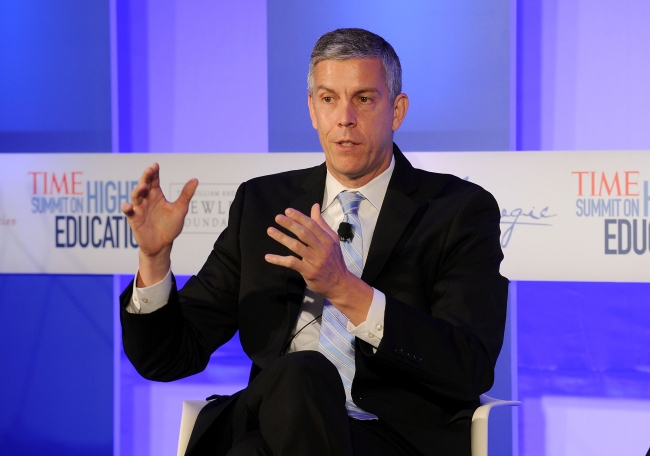You have /5 articles left.
Sign up for a free account or log in.

Arne Duncan in New York on Friday
Getty Images
Education Secretary Arne Duncan on Friday admonished critics of the Obama administration’s plan for a federal college rating system and pledged to move full-speed ahead in developing the metrics by which institutions will be judged.
The reaction to the proposal by some college leaders and higher education groups had been “premature and more than a little silly,” Duncan said in remarks at the Time Summit on Higher Education in New York City. He said that the difficulty of creating a ratings system for higher education should not be an excuse for inaction, urging higher education leaders to stop “propping up the status quo.”
The Education Department will produce a draft rating system in about a year and a final version by December 2014, Duncan said. The administration has said its goal is to launch a rating system in the 2015 academic year and persuade Congress to link that system to federal student aid dollars by 2018.
Duncan also provided a glimpse Friday of how the ratings system will be structured. The administration has not yet decided precisely which criteria it would use to rate colleges, Duncan said, but promised to take a “holistic” approach to judging colleges on access, affordability and student performance.
The broad goal, he said, is to determine “how many students at an institution graduate, at a reasonable cost, without a lot of debt, and get a job that enables them to support themselves and their families.”
Duncan floated examples of possible specific metrics: the percentage of students receiving Pell grants; the average amount of tuition, scholarships and loan debt; graduation and transfer rates; the salaries of graduates; and the extent to which graduates pursue advanced degrees.
In chiding the critics of Obama’s ratings proposal Friday, Duncan also took aim specifically at a remark made last month by a representative of the American Council on Education, the umbrella group for higher education associations in Washington.
Terry W. Hartle, the group’s senior vice president for government and public affairs, said that the administration had an “obligation to have perfect data” if it wanted to link federal student aid dollars with a college’s rating.
“That lobbyist was starting from the wrong premise,” Duncan said Friday, without referring to Hartle by name. The right question, Duncan added, was instead whether “the ratings would constitute a big step forward in making college costs and outcomes more transparent” when compared to the existing system.
Hartle said in an interview Friday that he stood by his comment.
“I have great respect for the secretary but if the federal government develops a high-stakes ratings system, they have an obligation to have very accurate data,” Hartle said. “I am surprised that anyone would think it controversial that having such data is a prerequisite.”
Ben Miller, a senior policy analyst at the New America Foundation, which has largely embraced Obama’s proposal, lauded Duncan’s speech for so forcefully taking on higher education lobbyists.
“It did a nice job of defining the terms of the debate,” he said. “I think it’s important to call them out and send a clear message that if you have thoughtful ideas for doing this well, we’re open to them. But not if you’re just going to reject this out of hand.”
Hartle said that having high-quality data is “not an impossible standard for the federal government to meet” since it is able to do that in other areas, such as measuring the student loan default rate.
Duncan said Friday that the department would “initially” begin crafting metrics with data that already exist. He did not mention proposals for better data on student outcomes -- such as the student unit record database -- that some higher education reformers have pushed. Many traditional colleges and universities, especially those at private nonprofit institutions, previously lobbied successfully for a federal ban on such a database.
Education Department officials on Thursday discussed the ratings proposal with student advocacy groups in Washington, the beginning of what they said would be a series of discussions with higher education stakeholders in the coming year. The administration will solicit specific input from “technical experts” about the metrics involved in the rating system, Duncan said.




